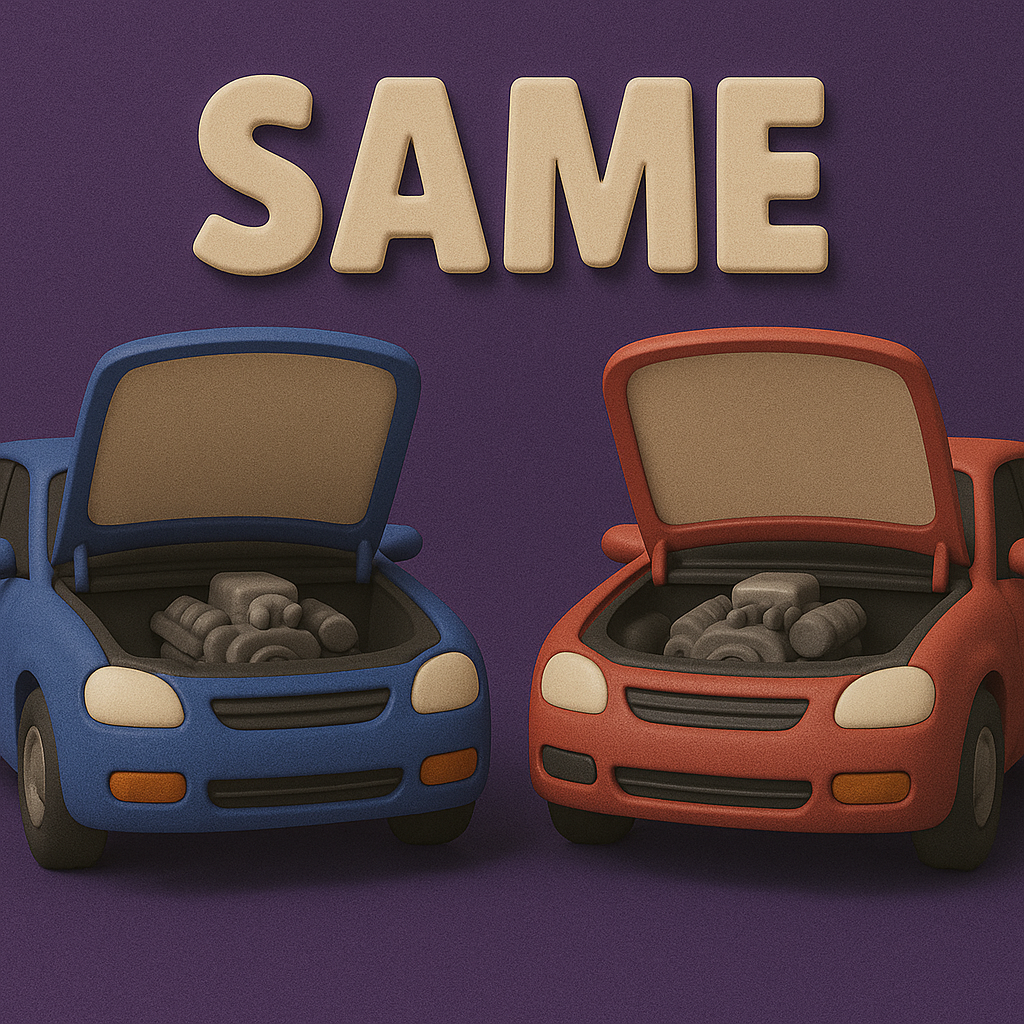Same
Definition
The word "same" refers to something identical or unchanged in comparison to another thing (adjective). It can also mean "the very one" (pronoun) or be used to emphasize similarity (adverb).
Parts of Speech
- Adjective
- Pronoun
- Adverb
Pronunciation
American English
- IPA Pronunciation: /seɪm/
- Respelling: SAYM
British English
- IPA Pronunciation: /seɪm/
- Respelling: SAYM
Etymology
The word "same" originates from the Old English "same," meaning "identical, similar," derived from Proto-Germanic "*samaz" and ultimately from the Proto-Indo-European root "*sem-," meaning "one, together."
Derivatives
- Sameness (noun)
- Samey (adjective, informal)
- Selfsame (adjective)
- Unchangingly (adverb)
- Samewise (adverb, rare)
Synonyms
- Identical
- Equal
- Alike
Antonyms
- Different
- Distinct
- Opposite
Usage
The term "same" is frequently used in conversations and texts to denote similarity or identity. For example: "We have the same schedule this semester," or "They acted in the same way as before."
Related Terms
- Similar: Having a likeness or resemblance.
- Equivalent: Equal in value, measure, or meaning.
- Uniform: Remaining consistent across situations.
Detailed Definitions
Adjective
- Identical or unchanged: Describes something that is exactly like another.
- Example: "They wore the same dress to the party."
- Not different in nature or essence: Refers to entities sharing the same properties or qualities.
- Example: "The two cars have the same engine model."
Pronoun
- The very one: Refers to a specific thing already mentioned or implied.
- Example: "He used the same to complete his task."
Adverb
- In the same manner: Refers to actions or situations performed identically.
- Example: "They behaved the same as yesterday."
same



🇨🇳 Mandarin
- 相同 (Same): Xiāngtóng
- IPA: /ɕi̯ɑŋ˥˥ tʰʊŋ˥˥/
- Respell: Shi-ang-tong
- 一样 (The same as): Yīyàng
- IPA: /i˥˥ i̯ɑŋ˥˥/
- Respell: Yi-yang
🇮🇳 Hindi
- समान (Same): Samān
- IPA: /səmɑːn/
- Respell: Su-maan
- वैसा ही (The same as): Vaisā hī
- IPA: /ʋəisaː hiː/
- Respell: Vai-saa hee
🇪🇸 Spanish
- Mismo (Same): Mismo
- IPA: /ˈmismo/
- Respell: Mee-s-mo
- Igual que (The same as): Igual que
- IPA: /iˈɣwal ke/
- Respell: I-gwal ke
🇫🇷 French
- Même (Same): Même
- IPA: /mɛm/
- Respell: Mem
- Comme (The same as): Comme
- IPA: /kɔm/
- Respell: Kom
🇸🇦 Modern Standard Arabic
- نفس (Same): Nafs
- IPA: /nafs/
- Respell: Nafs
- كما (The same as): Kama
- IPA: /kæmæ/
- Respell: Ka-ma
🇧🇩 Bengali
- একই (Same): Ēkai
- IPA: /e.kai/
- Respell: E-kai
- একই মতো (The same as): Ēkai mōtō
- IPA: /e.kai mo.to/
- Respell: E-kai mo-to
🇷🇺 Russian
- Тот же самый (Same): Tot zhe samyy
- IPA: /tot ʐɛ ˈsamɨj/
- Respell: Tot zhe sa-my
- Как и (The same as): Kak i
- IPA: /kak i/
- Respell: Kak i
🇵🇹 Portuguese
- Mesmo (Same): Mesmo
- IPA: /ˈmɛʃmu/
- Respell: Mesh-mu
- Como (The same as): Como
- IPA: /ˈkõ.mu/
- Respell: Kom-mu
🇮🇩 Indonesian
- Sama (Same): Sama
- IPA: /ˈsama/
- Respell: Sa-ma
- Seperti (The same as): Seperti
- IPA: /səˈpərti/
- Respell: Se-per-ti
🇩🇪 German
- Gleiche (Same): Gleiche
- IPA: /ˈɡlaɪçə/
- Respell: Gli-che
- Wie (The same as): Wie
- IPA: /viː/
- Respell: Vee
🇯🇵 Japanese
- 同じ (Same): Onaji
- IPA: /o̞na̠ʑi/
- Respell: O-na-ji
- のように (The same as): No yō ni
- IPA: /no joː ni/
- Respell: No yo ni
🇻🇳 Vietnamese
- Giống (Same): Giống
- IPA: /ɣiəwŋ˧ˀ˨ʔ/
- Respell: Gi-owng
- Như là (The same as): Như là
- IPA: /ɲɨ˧˩ laː˧/
- Respell: Nyuh la
🇰🇷 Korean
- 같은 (Same): Gateun
- IPA: /ɡat̚ɯn/
- Respell: Gat-un
- ~처럼 (~cheoreom, The same as): Cheoreom
- IPA: /t͡ɕʰʌɾʌm/
- Respell: Cheo-reom
🇹🇷 Turkish
- Aynı (Same): Aynı
- IPA: /ajnɯ/
- Respell: Ay-ny
- Gibi (The same as): Gibi
- IPA: /ɟibi/
- Respell: Ji-bi
🇵🇰 Urdu
- یکساں (Same): Yaksān
- IPA: /jək.saːn/
- Respell: Yak-saan
- جیسا (The same as): Jaisā
- IPA: /d͡ʒeː.saː/
- Respell: Jay-saa





